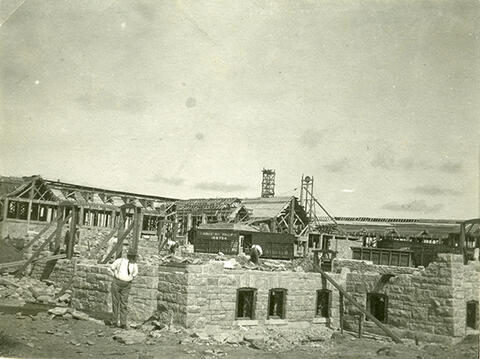
Zona do título e menção de responsabilidade
Título próprio
Dean of Agriculture's Residence - Construction
Designação geral do material
- Material gráfico
Título paralelo
Outra informação do título
Título e menções de responsabilidade
Notas ao título
Nível de descrição
Item
Entidade detentora
Código de referência
Zona de edição
Menção de edição
Menção de responsabilidade da edição
Zona de detalhes específicos de materiais
Menção da escala (cartográfica)
Menção da projecção (cartográfica)
Menção das coordenadas (cartográfico)
Menção da escala (arquitectura)
Autoridade emissora e denominação (filatélica)
Zona de datas de criação
Data(s)
-
15 Aug. 1911 (Produção)
Zona de descrição física
Descrição física
1 photograph : b&w ; 8 x 10.5 cm
1 negative : b&w ; 3.2 x 4.3 cm
Zona dos editores das publicações
Título próprio do recurso continuado
Títulos paralelos das publicações do editor
Outra informação do título das publicações do editor
Menção de responsabilidade relativa ao editor do recurso contínuo
Numeração das publicações do editor
Nota sobre as publicações do editor
Zona da descrição do arquivo
Nome do produtor
História custodial
Âmbito e conteúdo
View of construction of the Dean of Agriculture's Residence. An unidentified man stands facing camera in foreground; railway car visible in background.
Bio/Historical Note: The Dean of Agriculture’s residence was among the first buildings on campus. Designed by Brown & Vallance of Montreal, the original plan called for a wood-clad structure but this was abandoned when the Board of Governors decided in May 1911 to use local greystone. Unlike several of the larger buildings, the Dean’s residence was built by university employees with the assistance of day labourers. Construction took less than a year and costs ran to nearly $25,000. Sometimes known as the “Grey Gables,” the building’s first resident was William J. Rutherford, first Dean of Agriculture. The location of the house, on campus close to the University Farm, reflected the unique relationship of the Agricultural College with the university. In addition to a family residence, the adjourning grounds were used on occasion as the site for outdoor receptions and social gatherings. Talk of starting a Faculty Club at the University of Saskatchewan started in 1921, but a club was not established until 1927. The centre for the club was a reading room in the College Building; and the club's major purpose became sponsoring a series of lectures by faculty members. Slowly, over the years, the club was also opened to other than faculty members: in 1937, government researchers were allowed to join; as were senior administrative personnel in 1959; and by 1962, a degree was no longer a requirement of membership. By 1974, most administrative officers were permitted to join.
A controversial issue of the 1940s was to admit women members of faculty to the club. At a 19 November 1943 meeting, J.R. Fraser moved, seconded by J.B. Harrington, that women members of staff be admitted to the Faculty Club.” There was an amendment, moved by J.F. Leddy, seconded by A.P. Arnason “that the name of the club be changed to the Men’s Faculty Club.” The amendment carried. So the club was called the Men’s Faculty Club for four years, until 21 March 1947 when on a motion of Ansten Anstenson, seconded by J.B. Harrington “that the name of the club be changed to the University of Saskatchewan Faculty Club and that women members of the faculty be admitted.” Carried. The last Dean to live in the house was Victor E. Graham who moved out in 1961 so the building could be converted into a faculty club, which opened in 1962. The building underwent two more renovations in 1966 and 1975. The latter was the most extensive, at a cost of $607,961, and established the footprint of the building as it exists today. At 3:00 pm on 19 September 1972, a fire that had been smoldering in the roof insulation for hours became apparent inside the club. The building was evacuated and an alarm called into the Fire Department. Six units were eventually dispatched to battle the “stubborn” fire before a crowd of several hundred onlookers. No one was injured and the building was saved from catastrophic damage. The Faculty Club is now known as the University Club. The club closed in March 2020 due to the COVID-19 pandemic, and plans to re-open in 2022.
Zona das notas
Condição física
Fonte imediata de aquisição
Organização
Idioma do material
Script do material
Localização de originais
Disponibilidade de outros formatos
Restrições de acesso
There are no restrictions on access.
Termos que regulam o uso, reprodução e publicação
Photographer: Unknown
Copyright holder: Public domain
Copyright expires: Public domain
Other terms: Responsibility regarding questions of copyright that may arise in the use of any images is assumed by the researcher.
Instrumentos de descrição
Materiais associados
Ingressos adicionais
Location note
Vol. 3 / Neg. Vol. 1

